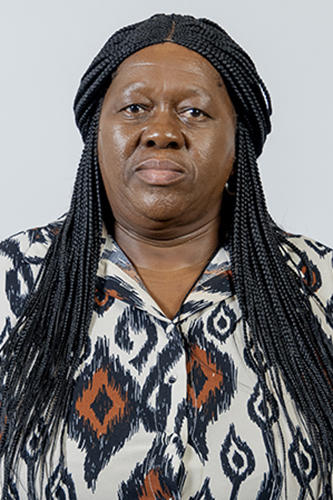Sheilla Tembalam Xego

Sheilla Tembalam Xego
MP IN THE NATIONAL ASSEMBLY
Sheilla Tembalam Xego
MP IN THE NATIONAL ASSEMBLY
REGION: Amathole
PCO NAME: Dutywa
PCO CODE: 737
PHYSICAL ADDRESS: 277 Maduna Street, Idutywa, 5000
Constituency Office
Parliamentary Career
Current:
Member at Portfolio Committee on Tourism (National Assembly Committees) Alternate Member at Portfolio Committee on Communications (National Assembly Committees)
Political Career:
Current:
Past:
My interest in politics started way back in 1976 and 1977 when I was young and still attending teaching college. I started teaching in 1980 and then joined a teacher union. As a unionist I became actively involved in politics. From 2000 to 2006 I served as a Councillor in Mbhase Municipality in the Eastern Cape. I then became a Councillor in the Amathole District Municipality and served from 2006 to 2010. In 2011 I was elected to serve as a Member of Parliament.
REGION: Amathole
PCO NAME: Dutywa
PCO CODE: 737
PHYSICAL ADDRESS: 277 Maduna Street, Idutywa, 5000
Constituency Office
Parliamentary Career
Current:
Member at Portfolio Committee on Tourism (National Assembly Committees) Alternate Member at Portfolio Committee on Communications (National Assembly Committees)
Political Career:
Current:
Past:
My interest in politics started way back in 1976 and 1977 when I was young and still attending teaching college. I started teaching in 1980 and then joined a teacher union. As a unionist I became actively involved in politics. From 2000 to 2006 I served as a Councillor in Mbhase Municipality in the Eastern Cape. I then became a Councillor in the Amathole District Municipality and served from 2006 to 2010. In 2011 I was elected to serve as a Member of Parliament.
REGION: Amathole
PCO NAME: Dutywa
PCO CODE: 737
PHYSICAL ADDRESS: 277 Maduna Street, Idutywa, 5000
Constituency Office
Parliamentary Career
Current:
Member at Portfolio Committee on Tourism (National Assembly Committees) Alternate Member at Portfolio Committee on Communications (National Assembly Committees)
Political Career:
Current:
Past:
My interest in politics started way back in 1976 and 1977 when I was young and still attending teaching college. I started teaching in 1980 and then joined a teacher union. As a unionist I became actively involved in politics. From 2000 to 2006 I served as a Councillor in Mbhase Municipality in the Eastern Cape. I then became a Councillor in the Amathole District Municipality and served from 2006 to 2010. In 2011 I was elected to serve as a Member of Parliament.

